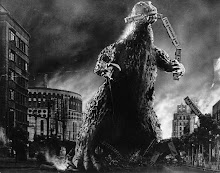
Singin' in the Rain - 1952
Directors: Gene Kelly, Stanley Donen
Writers: Adolph Green, Betty Comden
Players: Gene Kelly, Donald O'Connor, Debbie Reynolds
IMDB #78 [http://www.imdb.com/title/tt0045152/]
The Gist:
Gene Kelly is a big movie star in the silent era. His character is about to experience the upheaval of sound's influence on film in the 1930s. During this great time of change, many well established stars were forced into a desperate position to translate their screen presence to the "talkies". Some succeeded, some did not. Gene Kelly's character happens to have a wonderful singing voice, great diction, and can also dance. He's pretty much set but it takes him a little while to figure it out. Meanwhile his costar has a horrid nasally accent but we don't like her much anyway so there's not much conflict from her. So where does the conflict come from? Some of it comes from Gene Kelly chasing after his bird, but they're together from the early middle of the film onward. On paper, this film looks as if it has no real great conflict at all (the greatest conflict coming at the end from the suddenly introduced insidious plotting of nasally costar). So if that's the case, why does this movie work so well? ...I'm not sure.
Why This Movie Kills:
One way it accomplishes a sense of conflict and innate watchability is by setting up great subversive commentary on Hollywood. So many people talk about how this film represents the golden age of cinema, but I haven't read much about how keen its eye was of the foolishness in Hollywood. The overly glamorized premieres and the mythologized beginnings of Don's career (Gene Kelly). In the opening he gives this wonderful monologue of how he got into the pictures, complemented with flashbacks showing it for what it is: bullshit. On the surface you can think of it as being funny because he's full of shit, but when you realize that its really that all of the great stars have a lot of pretty lies to better create an image and product you realize it's a pretty impressive thing to comment about in a film of its time. Other examples include the studio feeding the press rumors of the a costar romance to help sell tickets. Or the fumbling of sound projects. The idiotic perception that writing wouldn't matter, that they could sell tickets with the characters just saying anything. This hints at studio patterns today, putting out summer blockbuster movies laden with special effects but without a substantial plot to justify all the pretty bloodshed on screen.
On Another Note:
The romance really is handled very nicely in the film, and there probably is a good deal more conflict with the translation to sound then I'm suggesting. I'm just saying that with many movies like this (from this era of filmmaking up to recent hollywood productions), you get the idea that everything is going to be fine. Which can be good, can be comforting, but often makes it much harder for that film to transcend its modest entertainment qualities to the realm of greatness. This film does. Every scene is incredibly well written (not to mention occasionally very eccentric which I love), all the songs contribute to the plot in some small way, it really is one of the best musicals I've ever seen.
My Nitpicks:
Ironically for one of my favorite musicals I really didn't think it had that great of music. The music was good, and worked well as almost a commentary on the kinds of songs that were sung during the time frame but the film's songs aren't as catchy as some of the later musical masterpieces (Cabernet, Funny Girl, My Fair Lady, Sound of Music, West Side Story). And yet this movie stands toe to toe with them, because everything fits together so fucking well.

No comments:
Post a Comment